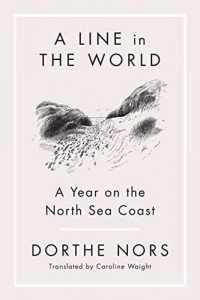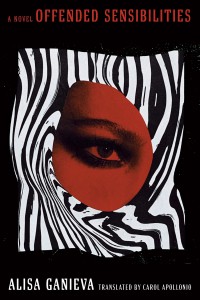In this month’s of newly released translations, we are featuring works that traverse across landscapes of psychology, politics, perspectives, and coastal enclaves. From a travelogue that corporealizes a vision into reality, a fragmented ghost story that equally interrogates readership with writership, and a psychically dense political fiction that follows the twists of truths into fictions, these works are full of metamorphoses, imaginations, and materializations—all that possible within the realm of the text.

A Line in the World, A Year on the North Sea Coast by Dorthe Nors, translated from the Danish by Caroline Waight, Graywolf Press, 2022
Review by Samantha Siefert, Marketing Manager
A line extends from Skagen, Denmark to Den Helder, Holland—a complex, jagged, six hundred mile stretch of coast. On a map, it is a fixed mark, something definite and present, representing a real place that exists today: the division between land and sea, a place of dunes and marshes, sweeping tides, surging storms, wind farms, gulls, and people. In A Line in the World, A Year on the North Sea Coast, celebrated Danish author Dorthe Nors asserts her dream for this line to be less static and more flexible, persistently animated, always moving, ever changing, evolving with its points marked in time just as much in time as they are in space. Her line reverberates heritage and memory, holidays, tragedy, Vikings, shipwrecks, disco ferries, and local gossip. In this first work of nonfiction, Nors brings Denmark’s western coast to life in fourteen essays, now available in a beautiful translation by Caroline Waight.
Each essay offers an exquisite, layered exploration of a different stretch of that wild North Sea coast, and the first one begins at the top. Nors is from west Jutland, but she has found herself living in Copenhagen, with a noisy neighbor next door and a hash dealer below, and she comforts herself there with sounds of the sea played through an app on her phone. She did not plan to write a book of essays (she was supposed to be working on a novel), but her publisher was insistent. They asked, and then they asked again.
I said, ‘I’ll have to think it over,’ and I did. Or I dreamt. In the dream, I was setting off across the landscape in my little Toyota. I saw myself escaping several years of pressure from the media by driving up and down the coast. Me, my notebook and my love of the wild and desolate. I wanted to do the opposite of what was expected of me. It’s a recurring pattern in my life. An instinct.
A Man Booker International Prize finalist for her works of fiction, Nors is one of Denmark’s best-known living writers, and the possibility that this project might not have existed soon comes to feel unimaginable, as each chapter unfolds in poetry that becomes as much an exploration of self as one of place. “You always know before you know,” Nors says of the forces at work. In her apartment in Copenhagen, a map is taped to the back of a door, an augury. Soon she becomes the owner of a house on the central west coast of Denmark, tracing a line along the sea in her little Toyota. “I don’t belong here, according to the locals,” she says, “but I have roots here. Strong roots. They run through my senses, my family, our history, and they reach my love of the Limfjord and the North Sea.” In inviting readers to her corner of the world, Nors reveals the intimate secrets and memories that make a place real.
Among the beach grass, lyme grass, and crowberry stalks of the battered landscapes, Nors confides in us. One essay takes her to Denmark’s westernmost point, wherein her gaze from the Blåvandshuk Lighthouse follows a network of undersea cables to a garden of windmills—a “white forest. . .built by humans wanting to colonize the world with a green future.” It then takes us to the beach, which in her youth had been spotted with World War II landmines, and then to the story of how her father met her mother: he was a recruit conducting military training exercises, and she was a warrior with red hair and pirate-style trousers. From the beach, her mother’s warrior brethren, the Vikings, ventured onward, westward, setting sail with the Angles and the Saxons. “When does a story begin?” Nors asks. “Always somewhere else, always further back in the text, beyond the horizon, in the unknown, under Yggdrasil, perhaps? Or a gigantic wind-fed tree contrived by engineers.”
In this way, A Line in the World is no ordinary travel memoir, and its line connects the stories of each place like living tissue. Nors observes what others would not, mixing memory, history, nature, culture, and journalism in a deeply personal exploration of Danish geography. She is a feminist. Many of her colleagues and consultations are with other women, and she notes their absence or oppression when she looks backward. In this book, she reclaims that space:
Women’s relationships with the landscape were relatively undocumented. Their feeling for nature was at best irrelevant, at worst dangerous. But now I have claimed the right to see and to describe. The landscape must have an essence that, in itself, can speak. Something that cannot be captured with compasses and spirit levels, that cannot be made harmless with weapons.
Nors is a feminist and she is an environmentalist. She commends Denmark’s modern Vikings: “Our new warriors—engineers, operators, service technicians” who “set out into the world and build forests of wind,” but with equal measure each chapter defers to the ever-changing tides. “The sea is always strongest,” Nors reminds us again and again. Ships sink, buildings are consumed, graves are dug, and there is always another storm surge coming.
A Line in the World, A Year on the North Sea Coast leaves readers fully steeped in places that are rarely trod. For Danes, the western lands would be foreign to many urbanites, just as Nors’s views may be other to Jutlanders. And for English readers, Caroline Waight’s beautiful translation is a gift, rendering one of the few books on this region in captivating prose. What’s unexpected is the familiarity English readers may find in these far-off places. More than six hundred words, Nors explains, made their way from Danish to English—sky, cake, law, water—and it was in her English classes that she found some reckoning with the “halfwit backofbeyond dialects” of her youth in west Jutland, where they still speak Scots—or perhaps in Scotland they speak West Jutish, she suggests. Finding commonality and kinship in this novel, however, is not surprising. There are many lines in this world to contemplate, but in accompanying Dorthe Nors along this one, we access something of the universal in the search for identity and belonging.

The Age of Goodbyes by Li Zi Shu, translated from the Chinese by YZ Chin, Feminist Press, 2022
Review by Laurel Taylor, Assistant Editor
This review is a form of criticism; the author of this review brings up criticism as a fulcrum by which she is making excuses for her own deficiencies in describing the novel she will go on to critique. Criticism is only one of the many stars in the constellation that is The Age of Goodbyes by Li Zi Shu, published in an electric translation from the Chinese by YZ Chin, and like any constellation, you immediately become aware that the shapes we perceive from earth are mirror products of our imagination—not unlike a novel.
My apologies to Li for mimicking poorly what she does so masterfully in this sprawling work. The Age of Goodbyes deftly weaves multiple storylines, some in the third person and some in the second, shifting back and forth across time from the 1970s to the present to the future. My opening paragraph is itself based upon Li’s opening paragraph, which begins, “You’re reading this book, which is a novel.” Naturally the novel in question is The Age of Goodbyes, the novel within the novel (within the short story within the work of literary criticism).
Reviews of The Age of Goodbyes have made much of the fact that it begins on page 513, a reference to Malaysia’s May 13 incident in 1969, two days after a general election charged with racial and economic disparities. Though this violence kickstarts protagonist Du Li An’s own relationship with her lover and eventual husband Steely Bo, the riots are otherwise virtually absent from the narrative. Instead, this particular storyline—which is embedded in the novel adjacent to several other second-person narratives—follows Du Lian through the years as she confronts her husband’s infidelity, her own infertility, and her struggle to make a stable and profitable position for herself, no matter the cost to her friends and family. Moments of the heart wrenching relationships of women at the mercy of the men they love form the fragmented backbone of the “realist” novel within the novel, but these scenes are spliced with tales about the author (who is not the author), the critic (who is maybe the author), and the aspiring author (who is also maybe the author).
The violence of 1969, rather than being the star of the novel, fades into the background and haunts the narrative, as many other figures and characters haunt the narrative. One of the second-person narrators is haunted by a twin who may or may not exist; another second-person narrator (possibly the same person but possibly not) is haunted by his mother’s ghost; one of the Du Li Ans (there’s more than one) is haunted by the shadow of her husband’s previous family; and the literary critic, known only as The Fourth Person, is haunted by Shaozi, the author of The Age of Goodbyes. Even the very landscapes the characters inhabit feel alive with spirits and ghosts, witnesses to the slow decay of the old giving way to the gentrified.
The third floor of Mayflower is saturated with the smell of cigarettes. Every room seems to be occupied by lingering ghosts and filled with otherworldly noises and odors. As if possessed, the stairs’ wooden steps moan before a foot has even placed on them. All the doors have rusty hinges and protest whenever they are pushed or pulled. The taps in the bathrooms can never be turned quite tight enough and produce drips like Time’s unceasing dance.
As with all good ghost stories, those figures who first feel substantial soon metamorphose and shift, becoming one another, unmooring the various storylines and retying them into a gordian knot. Characters double and triple as they look into mirrors only to find someone else “stashed” in that glass world beyond, or similarly tucked into the pages of a book. I found myself again and again trying to trace the connections between each separate storyline, hypothesizing in the same way the second-person narrator reading The Age of Goodbyes hypothesizes Shaozi’s inspirations and autobiographical insertions. But to reach for logic in this narrative belies the utterly illogical nature of life.
Li even anticipates our desire for sense-making in her imagined Fourth Person critic, a man who dedicated his life to Shaozi’s work out of both obsession and frustration at how little she divulges of herself. As one of the second-person narrators reads through The Fourth Peron’s works of criticism, he thinks:
Being purely a reader, you intuit that many critics can only manage to be just that—professional critics, never real readers. They are more inclined to show off their so-called unique perspectives and contrived reading attitudes. Among them, The Fourth Person is the créme de la créme, and yet the more he invests in seeking various channels into a story, the more violently a story resists him, applying an opposing force and reaction.
As such, I will set aside my critic and attempt to be “a real reader,” not analyzing but rather lingering in Chin’s luxurious translation. I was struck by Chin’s willingness to embrace the diversity of English, lingering in lush descriptions that enervate the streets and characters of the unnamed tin-mining town Du Li An’s story inhabits. “Ah Sai did not reply. Du Li An’s reference to ‘your brother-in-law’ reminded him of Sou Gei. It was at that moment he finally felt, keenly, that Sou Gei no longer existed in this world. No more of her nagging kvetches over the phone. No more nudges for him to call his sister.” In this passage, the word “kvetch” caught my eye. I immediately imagined a riot of editors, workshoppers, and critics demanding to know what in the world a Yiddish word is doing in a translation of a Malaysian story soaked through with Taoist and Buddhist belief—to which I would answer: “What in the world is any English doing in a story written in Chinese, about a country which itself contains 137 living languages (many of which are mentioned in the narrative)?” Would the markedly British “whinge” somehow be better? What about the decidedly less evocative “grumbles”? English is a hodgepodge of loan words and idiosyncrasies built from more than just German and Latin; to deny translators the power and vivacity of those words, especially in a novel about a region which is so multilingual, only reproduces the othering of translation. Through those words, Chin is repainting characters with a brush that conjures their ghosts on the page, awakening memories of relationships that feel raw, real, and achingly familiar.

Offended Sensibilities by Alisa Ganieva, translated from Russian by Carol Apollonio, Deep Vellum, 2022
Review by Chinmay Rastogi, Executive Assistant
Coming at a time when many nations are bearing witness to ultra-nationalism leading to political strife, both within and outside their countries, Alisa Ganieva’s political fiction surmises rather well what it is to live in a time when every little act, no matter how innocuous, is scrutinized to see if it deviates from the rhetoric of ruling individuals. Although the setting of Offended Sensibilities is modern day Russia, the novel would resonate with anyone who has lived through times of political turmoil, offering a glimpse into an environment of daily struggles: friends turning on each other; students reporting their teachers for teaching a history inconsistent with the ‘official’ version; and both blue and white-collar workers scheming to defame and report one another in hopes of winning favour with people of political power, seeking to climb the ladder and reach a better life without daily concerns like rising food and living prices. It was curious to see this narrative carried out in the modern day of smartphones, social media, and data breaches; the first exchange of the novel results in: “About things people are afraid of. . . I have gotten scared of my telephone recently. Eyes everywhere, you know what I mean?”
It’s all been seen before, sadly, yet Ganieva’s take is soft and profound, even occasionally warm with humour—which offers a good contrast to the cold atmosphere of the novel, be it the Russian winters or the hardened lives. The focus on the daily matters of ordinary people, told through their own voices, makes this a book that tries to show individual struggles without rounding them up in a collective identity, and is further augmented by indicating how those in different levels of the societal hierarchy, despite eating different food and wearing different clothes, are driven by the same values and superstitions—and in this, how leaving one’s past behind never truly incites change. All this, however, comes by switching between perspectives every few pages, operating continuously by the balancing act of progressing the narrative while giving glimpses into the past.
In Offended Sensibilities, everything is connected to the unexplained death of a minister, and while it is interesting to see how those close to him—his wife, secretary, and mistress—as well as others like school teachers, office workers, political leaders, and the police act in the incident’s aftermath, there is a sense of things left hanging in each character’s arc. Each new voice offers something new and tries to propel the narrative forward or slows the tension, as in the long passages about Ella Sergeyevna’s life in the first few days following her husband’s death. Such moments shed light on the motives and tendencies of those working under people who abuse their power, albeit occasionally dampening the adrenaline of the moment.
Carol Apollonio as translator has done a stellar job of staying true to Ganieva and her style. There are instances of delightful alliteration like “galloping globs of gobbledygook”, and “Chashchin, Chashchin, cash in, slashin’ Chashchin, cheatin’ Chashchin”—which must be present in the original, and have been carried over to the translation on the back of great word choices. The tone is set rather well with the translation of a propaganda poster in the first few pages:
On the phone, be quiet and wise.
Blabbermouths attract the spies.
The enemy is vicious, mean, and hard.
Never let down your guard.
There are certain instances where the language might seem stiff and non-colloquial, but that is better attributed to the inner monologues of the characters and political speak; it is often challenging to make sense of either.
Throughout the novel’s political tensions, it was fascinating to see the depictions of media narrative as attacking the acts of blackmail and blame as a trend, an epidemic of facetious accusations to tarnish the reputation of those in power, thus shifting public attention from factual accounts and the matters of reality.
The rumour mill is never at rest, and Ganieva uses media, both social and traditional, to highlight a setting of constant surveillance and manipulation, a condition that is completely in line with the world we live in.
Though Offended Sensibilities is not the first time Alisa Ganieva has dabbled in political fiction, there comes a sense of playing the card too strongly at times within the prose, occasionally offsetting the progression of plot. However, the characters are all written as real, complex individuals, whether they are dealing with traumas like domestic violence, or keeping their sexual orientation hidden because of the enforced, orthodox political climate. In this, they populate the narrative almost to its brim with their various pasts, thoughts, values, and beliefs (often at odds with one another), and together they form the crowded cluster of social existence, in which we are all forced to consider the borders at which our lives meet other surrounding lives, and how easy, as it is, to then offend someone’s sensibilities.
*****
Read more on the Asymptote blog:

